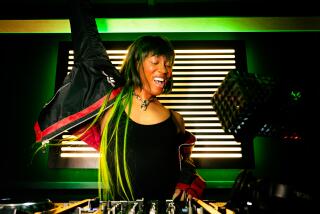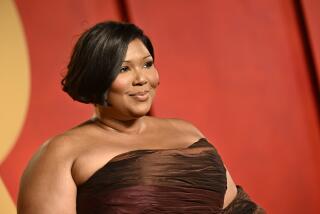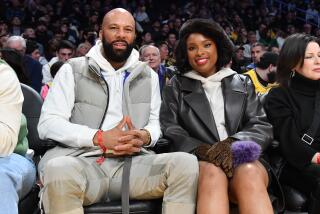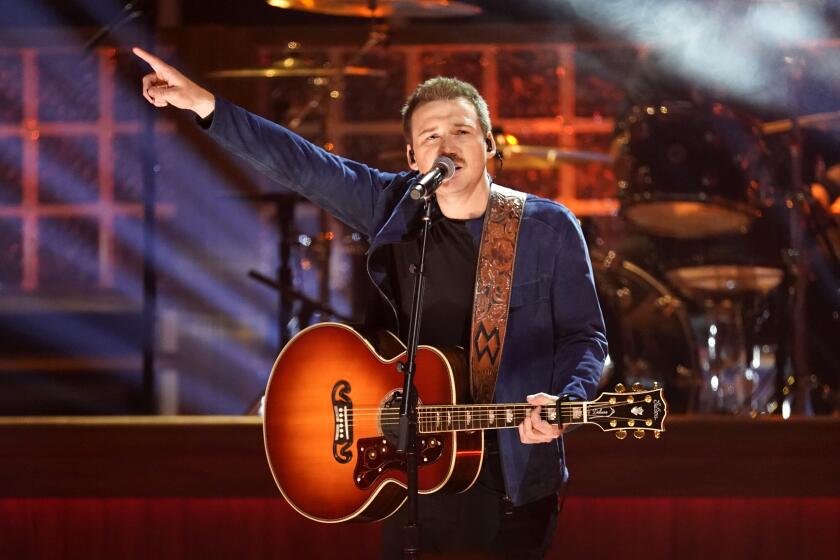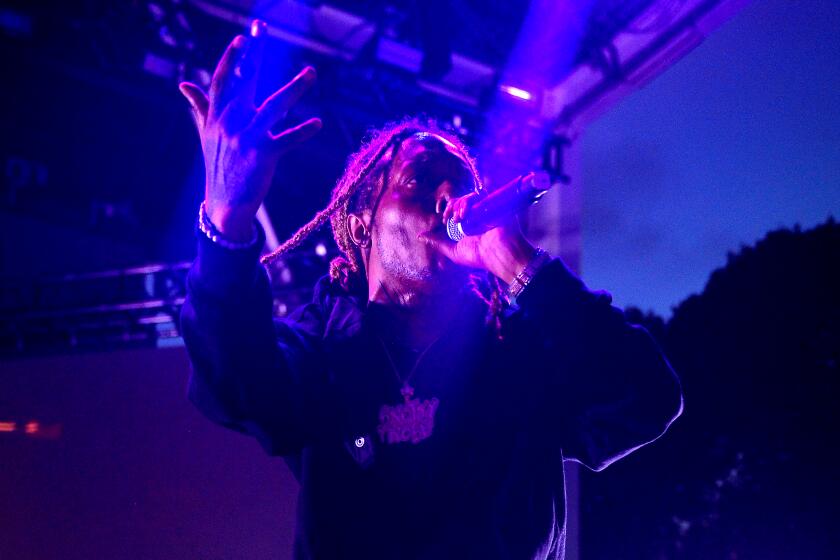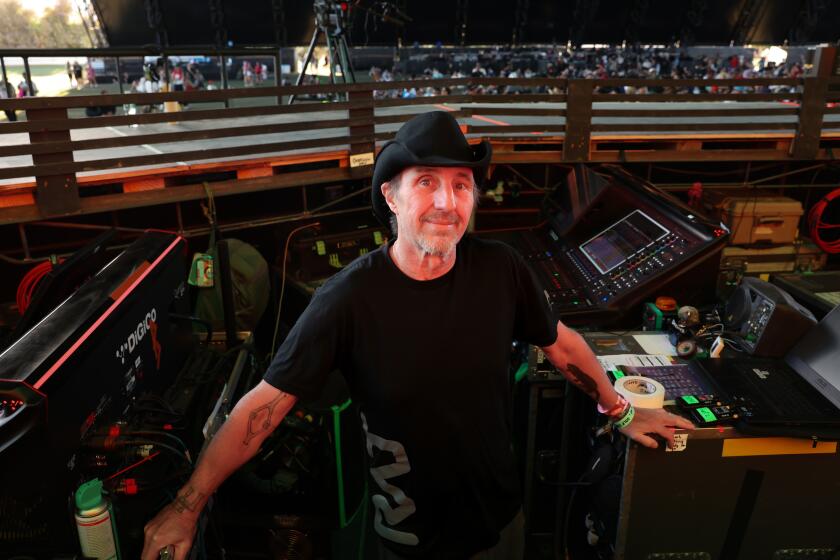Dawn Richard on her shape-shifting music: ‘I don’t care if people get it’
Dawn Richard is no longer moved by what people think of her.
It’s one reason why the shape-shifting artist reunited with Danity Kane — the group that launched her to pop fame a dozen years ago — for a tour, despite shouldering the blame for both of its previous breakups. “We have an understanding of who, and what, we are,” she says of her band mates (they are also working on new music together).
It’s why she’s never once veered from an idiosyncratic approach to R&B with ambitious, high concept projects — even if mainstream attention has eluded her — and it’s why she stopped engaging with anonymous online critics throwing shade about her looks.
“In the beginning, I cared so much what people thought. I wanted to make it so bad,” she says hours before a recent Danity Kane gig. “But I don’t really care anymore. I don’t care if people get it. I’ve learned that there are acquired tastes — and I’m one.”
That refusal to march to anything but her own drum has always been the core message of Richard’s work and it’s what drives her fifth LP, “new breed,” out this week. For the past decade, the singer-songwriter (she performs as DAWN) has been at the forefront of experimental R&B she calls “genderless, colorless and genreless” after finding success in Danity Kane and the hip-hop fusion project Diddy-Dirty Money.
Her “Heart” trilogy of albums — which launched with her 2013 debut, “Goldenheart” and concluded with 2016’s “Redemptionheart” — ripped apart the boundaries of soul and R&B as she made room for electronica and experimental art-pop weaved into a heady fantasy world built on Greek mythology, sci-fi and medieval allegories.
“Some artists’ journey is to be massive and a machine,” Richard says. “I got to live that life and it was bomb. And I’ve also done the indie thing and that was hard too. For me, the message is what always matters. I’m always gonna be me and that’s enough. I’m not for everyone and that’s OK.”
Richard writes richly complex tales of loss, heartbreak and triumph pulled from a life that has weathered its share of storms. She’s an industry survivor who’s been counted out and beaten down more times than she cares to count and has also persevered amid personal hardships: Her family was reeling from being left homeless by Hurricane Katrina when she got her big break by scoring a spot on the third iteration of “Making the Band,” which saw Sean “Puff Daddy” Combs manufacture an urban-pop girl group.
Danity Kane made history as the first girl group to consecutively debut albums at No. 1 (its earworm “Damaged” remains irresistible) before it disbanded during an awfully uncomfortable season-finale episode of “Making the Band” in which Combs fired one member he labeled “promiscuous” and another for not being a “happy camper.”
Richard forged ahead under Combs’ tutelage, anchoring his sleek, forward-thinking hip-hop fusion project Diddy-Dirty Money with her voice and songwriting. In 2011 she branched out on her own with a mixtape of enigmatic R&B she called “The Prelude to a Tell Tale Heart” that logged 1 million downloads within a month and has continued to release music independently since.
Every day that I walk out the door as a black woman in this industry I am taking a big risk.
— Dawn Richard, on her journey in the music industry
She cemented herself as an inventive visionary unbound by convention and a dynamo onstage known for back-bending choreography, outré costumes and a fiery vocal prowess. Whether it was becoming the first artist to perform on YouTube in 360 degrees, animating for Adult Swim (Danity Kane was actually named after the anime character she created in high school), or incorporating virtual reality technology into her music videos, Richard’s DIY spirit made her an incomparable force in indie music.
But Richard was exhausted of working as hard as she was — and spending so much of her own money — without getting the mainstream recognition she and her fans knew she’d have if she was given a shot.
“It’s all a numbers game,” she says with a heavy sigh when asked why she believes major opportunities have evaded her. “People don’t want to take risks on things they haven’t seen a trend happen for.
“Every day that I walk out the door as a black woman in this industry I am taking a big risk. To walk out into the world as a woman of color and try to innovate in a world where there is no color at all is such a risk. Black women are already ostracized and looked at negatively, so everything we do is a risk. … Every time we are counted against. That’s the hard part.”
It was enough to make the 35-year-old reconsider music. Burned out, she stepped away and ventured into acting, starring in last year’s “Kinky” and “5 Weddings” and appearing on an episode of HBO’s “Insecure.”
A return to her native New Orleans to visit her parents reignited her passion for music and inspired “new breed,” an homage to her hometown and an ode to her family’s history in the Washitaw Nation – a tribe of the Mardi Gras Indian Nation, groups said to have originated from freed slaves (her great uncle was inducted into the Mardi Gras Indian Hall of Fame for the intricate, hand-sewn suits influenced by West African and Native American ceremonial clothing the tribes wear for Mardi Gras).
While all of her work has been intensely personal, her latest project is her most intimate.
Between snippets of sermons and prayers from Mardi Gras Indians (Richard sought and received the blessing of Washitaw Nation leader Chief David Montana) and her father, singer Frank Richard of Chocolate Milk, plus her own emotional testimonies, Richard glides between bounce music, spaced-out dance beats, R&B, hip-hop, Afrobeat and psychedelic funk as she details how returning home helped her find herself.
“It’s really different for me,” she says of the album she wrote and co-produced alongside contributions from Cole M.G.N, Kaveh Rastegar and Hudson Mohawke. “I wanted to go someplace else and show how I’ve evolved as an artist.”
She implores women to take pride in their sexuality on the atmospheric “sauce,” confronts her ex’s ex on lead single “jealousy,” snipes at her detractors with a venomous swagger in “we, diamonds” and flips off sleazy industry men – or “wolves” as she calls them — who have degraded and disrespected her body.
“I never saw myself as a victim but have survived assault and I thought hiding it made me strong. But as I’ve watched all these amazing strong women speak on their experiences I found courage in speaking on my story. This record is for all of us,” she details in the album’s mission statement.
“As black women, we have been quiet,” she later explains. “We have been stifled in our voices because we are afraid to lose our jobs and whatever piece of semblance of awesome that we get. But not anymore … and I’m willing to risk it all to have a voice.”
For more music news follow me on Twitter:@GerrickKennedy
More to Read
The biggest entertainment stories
Get our big stories about Hollywood, film, television, music, arts, culture and more right in your inbox as soon as they publish.
You may occasionally receive promotional content from the Los Angeles Times.
